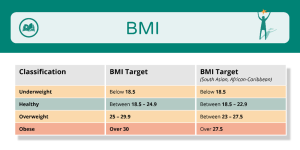What is Obesity?
The term obesity is used to describe a person who is very overweight and carrying a lot of excess body fat. This can in turn impair health and increases the risk of other health conditions developing.
The most widely used method to check if you’re a healthy weight is by using the body mass index (BMI). BMI is a measure of whether you’re a healthy weight for your height.
You can calculate your BMI using the NHS BMI Calculator.
The table below shows the categories used to classify the different BMI ranges.

However, BMI is not used to diagnose obesity as people who are very muscular can also have a high BMI without much fat. But for most people, BMI is a useful indication of whether they’re a healthy weight.
Causes
Obesity is generally caused by consuming more calories than you burn off through physical activity, particularly those in high fat and sugary foods. The excess energy is then stored as body fat.
It is becoming an increasingly common problem because for many people, modern living involves eating excessive amounts of cheap, high-calorie foods and spending a lot of time being sedentary or sitting down at desks, on sofas and in cars.
Being active benefits your body, mind, and health – and there are lots of easy ways you can get moving. Physical activity is anything that gets you moving. It’s not just about playing sport – it can be simple things such as walking, cycling, gardening or even vacuuming the floor.
To see the Wellness Service Move More offer, click here.
How can the Wellness Service help?
The Wellness Service offers two options for healthy weight support, this could be on a one-to-one basis or through group sessions.
Our aim is to help you achieve a healthier, balanced lifestyle through changes which are sustainable rather than promoting fad diets and quick fixes.
For more information on the healthy weight support offered by the Wellness Service, click here.